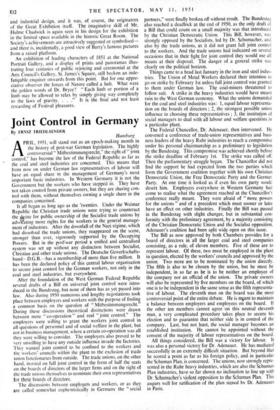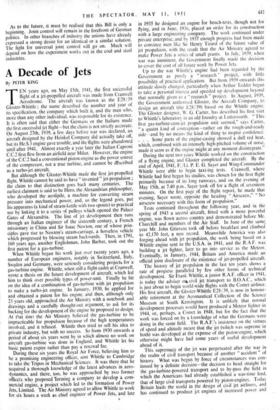Joi nt nt Control in Germany
By ERNST FRIEDLAENDER
Hamburg APIM.. 1951, will stand out as an epoch-making month in the history of post-war German legislation. The highly controversial' Mitbestimmungsrecht," the right of " Joint control." has become the law of the Federal Republic as far as the coal and steel industries are concerned. This means that from now on under German law representatives of labour will have an equal share in the management of Germany's most important basic industries. In Western Germany it is not the Government but the workers who have stepped in. They have not taken control from private owners, but they are sharing con- trol with them, without themselves owning a single share in the companies concerned. It all began as long ago as the 'twenties. Under the Weimar Republic the Christian trade unions were trying to counteract the sj&sire for public ownership of the Socialist trade unions by advarating more rights for the workers in the general manage- ment of industries. After the downfall of the Nazi regime, which had dissolved the trade unions, they reappeared on the scene, stronger than ever, vigorously supported by the Occupying Powers. But in the post-war period a unified and centralised system was set up without any distinction between Socialist. Christian and other trade unions. The Deutsche Gewerkschafts- bund—D.G.B.—has a membership of more than five million. It has been the declared policy of this central labour organisation to secure joint control for the German workers, not only in the coal and steel industries, but everywhere.
After the foundation of the West German Federal Republic several drafts of a Bill on universal joint control were intro- duced in the Bundestag. but none of them has as yet passed into law. Also during 1950 numerous and lengthy negotiations took place between employers and workers with the purpose of finding a common basis on the question of " Mitbestimmungsrecht." During these discussions theoretical distinctions were drawn between mere " co-operation " and real "joint control." The employers were willing to grant the workers joint control in all questions of personnel and of social welfare in the plant, but not in business management. where a certain co-operation was all they were willing to consider. The employers also proved to be very unwilling to have any outside influence invade the factories. They wanted joint control to be confined to the workers and the workers' councils within the plant to the exclusion of trade union functionaries from outside. The trade unions, on the other hand, insisted on full joint control in the form of half the seats on the boards of directors of the larger firms and on the right of the trade unions themselves to nominate their own representatives for these boards of directors.
The discussions between employers and workers, or as they are called somewhat euphemistically in Germany the "social partners," were finally broken off without result. The Bundestag also reached a deadlock at the end of 1950, as the only draft of a Bill that could count on a small majority was that introduced by the Christian Democratic Union. This Bill, however, was strongly opposed by the Socialists, led by Dr. Schumacher, and also by the trade unions, as it did not grant full joint control to the workers. And the trade unions had indicated on several occasions that in their fight for joint control they would use all means at their disposal. The danger of a general strike was clearly on the political horizon.
Things came to a head last January in the iron and steel indus- tries. The Union of Metal Workers declared their intention to go on strike by February 1st unless full joint control was granted to them under German law. • Thg coal-miners threatened to follow suit. A strike in the heavy industries would have meant ruin to the West German economy. What the unions demanded for the coal and steel industries was: 1, equal labour representa- tion on the boards of directors ; 2, the strongest possible union influence in choosing these representatives ; 3, the institution of social managers to deal with all labour and welfare questions in a particular plant.
The Federal Chancellor, Dr. Adenauer, then intervened. He convened a conference of trade-union representatives and busi- ness leaders of the heavy Ruhr industries to reach a compromise under his personal chairmanship as a preliminary to legislation by the Bundestag. This compromise was achieved shortly before the strike deadline of February 1st. The strike was called off. Then the parliamentary struggle began. The ChanCellor did not find the support he had expected from the two parties which form the Government coalition together with his own Christian Democratic Union, the Free Democratic Party and the Germar Party. At one time it looked as if even his own party would desert him. Employers everywhere in Western Germany had come to realise what the agreement reached at the Chancellor's conference really meant. They were afraid of "more powers for the unions" and of a precedent which must sooner or later have an effect on other industries. Finally the Bill was passed in the Bundestag with slight changes, but in substantial con- formity with the preliminary agreement, by a majority consisting of the Christian Democratic Union and the Socialist opposition. Adenauer's coalition had been split wide open on this issue. The Bill as now approved by both Chambers provides for a board of directors in all the larger coal and steel companies consisting, as a rule, of eleven members. Five of these are to represent labour. Of these, two must be employed in the plant in question, elected by the workers' councils and approved by the union. Two more are to be nominated by the union directly. The fifth is also to be chosen by the union, but he must be independent, in so far as he is to be neither an employee of the company nor an official of the union. The private owners will also be represented by five members on the board, of which one is to be independent in the same sense as the fifth representa- tive of labour. The eleventh man on the board was the most controversial point of the entire debate. He is mgant to maintain a balance between employers and employees on the board. If the other ten members cannot agree on this neutral eleventh man, a very complicated procedure takes place to secure his election and to guarantee that neither side is in control of the company. Last, but not least, the social manager becomes an established institution. He cannot be appointed without the consent of the majority of labour representatives on the board.
All things considered, the Bill was a victory for labour. It was also a personal victory for Dr. Adenauer. He has mediated successfully in an extremely difficult situation. But beyond ihat he scored a point as far as his foreign policy, and in particular the Schuman Plan, is concerned. The unions, now strongly repre- sented in the Ruhr heavy industries, which are also the Schuman Plan industries, have so far shown no inclination to line up with Dr. Schumacher's violent opposition to the Schuman Plan. This augurs well for ratification of the plan signed by Dr. Adenauer in Paris.
As to the future. it must be realised that this Bill is only a beginning. Joint control will remain in the forefront of German politics. In other branches of industry the unions have already expressed a strong desire for an identical or a similar solution. The fight for universal joint control will go on. Much will depend on how the experiment works out in the coal and steel industries.



































 Previous page
Previous page